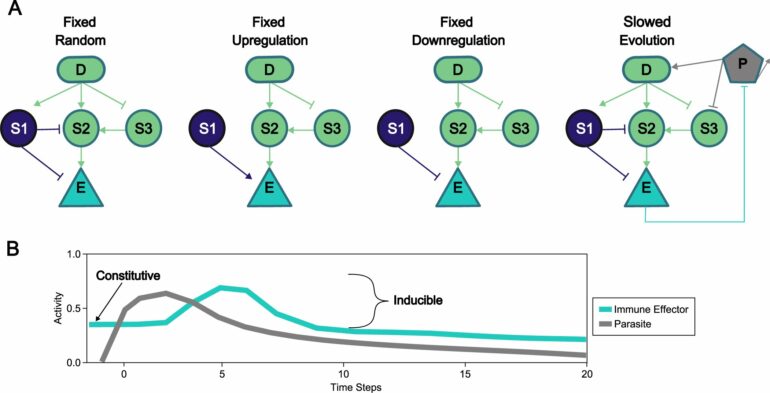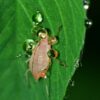Graduate student Reese Martin and his doctoral advisor, Ann Tate, assistant professor of biological sciences, used theoretical modeling to identify a potential relationship between genetic pleiotropy and the evolution of immune responses. The pair has authored a paper titled, “Pleiotropy promotes the evolution of inducible immune responses in a model of host-pathogen coevolution,” published in PLOS Computational Biology.
Martin used a metaphor to explain pleiotropy and inducible versus constitutive defenses. “Imagine you always want to have the lights on as soon as you enter a room. One solution would be to leave the lights on all the time, wasting energy when you aren’t in the room, another would be to set up a sensor that turns on the lights when you enter the room, saving energy but potentially leaving you in darkness as the lights come on,” explained Martin.
“The first solution here is akin to constitutive immunity—always investing energy in fending off parasites even when there are no parasites present. The second is akin to inducible immunity, where an investment in immunity only occurs when a sensor is triggered but the response may take time to ramp up, giving invaders time to prosper before your immune system can remove them.”
He then explained that pleiotropy, the phenomenon where one gene affects multiple traits, would be like using a single switch to turn on both the lights and a blender. In the metaphor, he imagined that it would be helpful if you wanted a smoothie every time you turned the lights on, but that otherwise this setup was wasteful at best.
The work was inspired by a perceived conflict between the rapid evolution of immunity, the usually slow evolution of pleiotropic genes, and the abundance of pleiotropic genes involved in immunity. Martin and Tate designed an evolutionary model where hosts were required to fend off parasites and the hosts that successfully fended off parasites created the next generation of hosts, with the potential to pass along a mutation to a child. Some hosts were also saddled with a trait in their immunity that could not be changed, corresponding to the slowly evolving nature of pleiotropic genes.
The pair tested several populations of hosts, one without pleiotropic genes and others with varying implementations of pleiotropic genes. In the first population, constitutive responses were common with some populations evolving inducible immune responses as the chance of being infected increased. Two of the pleiotropic populations were identical to the non-pleiotropic population, but two others expressed more constitutive immune responses or more inducible immune responses than the non-pleiotropic population. Despite being less common than constitutive hosts, inducible hosts were highly fit suggesting that the evolution of inducible immunity was challenging.
According to Tate, “Reese is an awesome computational biologist who is bringing theoretical teeth to many of the concepts, including the evolution of immune system signaling and the evolution of life-history trade-offs, that we are investigating in the lab. His work is complementing experimental work in the lab by forming new testable hypotheses, helping us see holes in our logic, and connecting the dots across different dynamical processes at ecological and evolutionary levels.”
Martin hopes, beyond the results above, that others will be able to build off the pair’s methods. He explained, “I’d like for people to see this kind of theoretical work as an explorative tool that can be used to inform future hypothesis and guide empirical experimentation.”
He developed an early love of science through paleontology. He explained that evolution has always been an interest of his, but now in graduate school, it has become the primary focus of his work.
He concluded, “I’m of the opinion that understanding how a biological process evolved is a major step in understanding how that process works today.”
More information:
Reese A. Martin et al, Pleiotropy promotes the evolution of inducible immune responses in a model of host-pathogen coevolution, PLOS Computational Biology (2023). DOI: 10.1371/journal.pcbi.1010445
Provided by
Vanderbilt University
Citation:
Researchers find evolutionary support for induced defenses (2023, April 14)



